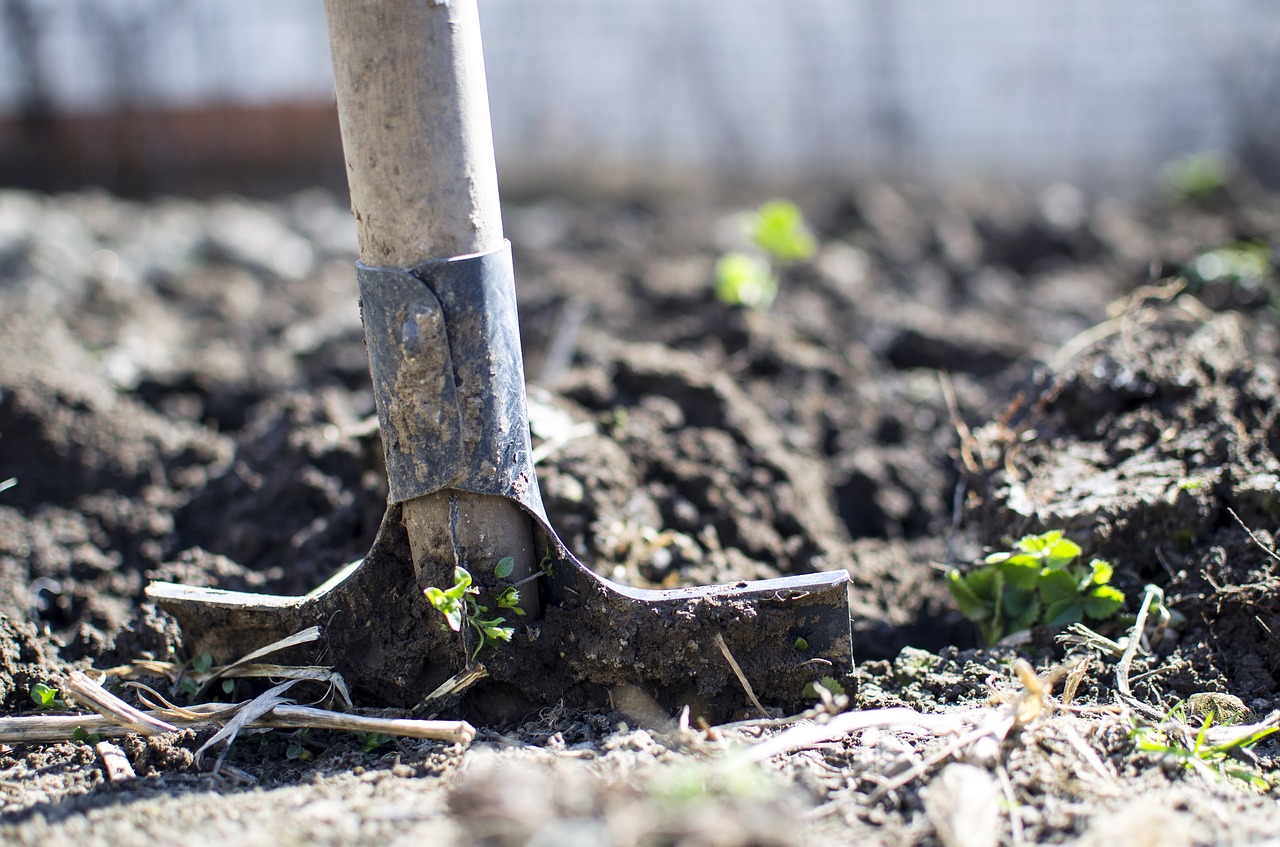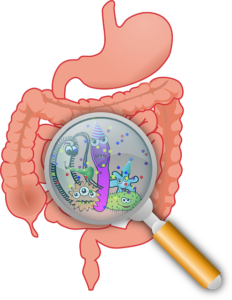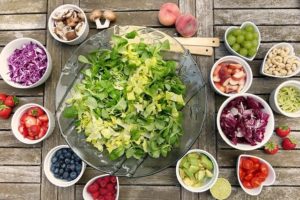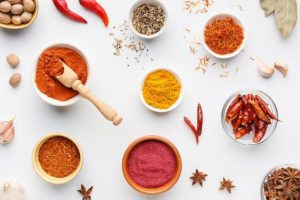My husband and I were walking around our yard today, looking at all of the fruit trees he had planted since we moved to our house several years ago. He commented on the fact that our soil was still very depleted of nutrients, and still needed to be amended.
During the past couple of years, he has really made an effort to replenish the soil with nutrients, and now we have noticed that many of our plants are starting to grow so much better.
However, keeping the soil nutrient-rich is an ongoing process.
This made me think about gut health, and how factors such as our diet, stress, medications, antibiotics and environmental toxins can destroy the nutrient-rich “soil”, or flora, of our intestines.
Ok. I admit it. I’m a nutrition nerd!
But just like my husband and I have to consistently work on the soil in our garden to keep it healthy, it’s important for our long-term health to regularly replenish the “soil” of our microbiome in order to keep our healthy bacteria in balance.
The role that our microbiome plays in our health is an evolving science.
Research has already found that the makeup of our intestinal microbiota has an effect on the prevention and treatment of various diseases, as well as neurological and mental health 1,2, 3 .
In other words, the composition and quality of microorganisms in your intestinal tract can have an effect the way in which your genes are expressed and therefore whether or not illnesses develop.
Nurturing our gut bacteria is critical to good health. But how do we do this?
While taking a high-quality probiotic supplement is a great way to help boost your microbial community, it is only part of the solution.
What we eat is another huge piece of the puzzle.
The foods that we eat have a direct effect on the types of organisms that

dominate our microbiome. These organisms can be beneficial or detrimental to our health.
Processed foods, oils, sugar, and fast food, feed the organisms that we do not want to dominate our gut4.
So what do we eat?
1. Fiber-rich vegetables and fruit.
It is well-established that eating a variety of vegetables and fruit is essential to our gut health 5. The fiber found in the vegetables and fruit are prebiotic, and help to feed the beneficial bacteria.
Additionally, eating vegetables and fruit has been shown to increase the bacterial diversity in our gut, as well as increase the number of beneficial bacteria.
I usually recommend that clients eat vegetables with each meal, and make sure that they are different types and colors.
2. Healthy fats and pastured meats.
The quality of fats and animal products that you eat also effects the quality of microbes that reside in your intestines. Most studies show the negative effect that meat and saturated fat have on your microbiome. Unfortunately, the quality of the meat and fats is rarely mentioned.
It is important to differentiate between meat that comes from animals raised in poor conditions at huge “factory” farms, vs. meat that comes from animals that are responsibly raised on smaller farms.
Most animals on large-scale farms are not in their healthiest state and need to be given antibiotics on a regular basis. These antibiotics are then in the meat that we consume and wreak havoc on our intestinal flora.
Fats, such as trans-fats, vegetable, seed and peanut oils are highly processed in factories. There is little to no nutritional value, and by the time they reach the shelf in the stores, they have oxidized. Consumption of these types of fat leads to inflammation and does not help our microbiome.
Conversely, fats from pasture-raised animals, high quality olive oil, coconut oil, and avocado oil are examples of fats that help our bodies and gut flora to thrive. This has been seen in various studies of traditional cultures around the world 6.
3. Fermented foods.
Fermented foods have been a staple to many cultures for generations. Full
of live probiotics, these foods and drinks are healing and restorative for gut health.
The probiotics in these products have been shown to regulate intestinal health and help to heal inflammatory bowel conditions 6.
They also help to bolster our immune health.
Some examples include:
- Unsweetened kefir (watch my tutorial here)
- Unsweetened yogurt
- Homemade or store-bought* sauerkraut
- Homemade or store-bought* kimchi
- Homemade or store-bought* pickles
- Kombucha with as little residual sugar as possible
*Note: Only store-bought fermented foods that contain live probiotic cultures will work. I didn’t mention store-bought kefir, because I have never seen a kefir in a store that was full fat and not full of sugar. With dairy products, full-fat, no sugar, and raw are preferred.
4. Spices.
The spices that we use in cooking, such as cinnamon, rosemary, and turmeric have so many amazing properties. Culinary spices are anti-inflammatory, and anti-viral, and they also benefit our gut bacteria.
Studies have shown that regular consumption of spices with your food can not only increase your gut flora, but also can have positive changes on its composition 7.
Try to start experimenting with new flavors when you cook. I love cinnamon and put it on almost everything.
Feeding your flora is an ongoing process
Repairing intestinal permeability and restoring intestinal flora is an important part of the process when I am working with a client. Although many chronic and autoimmune illnesses have been linked with poor gut health, the great thing is that we can do something about it.
Do you eat any of these foods a daily basis? Let me know your favorites in the comments below!
Ready to take control of your autoimmune disease and find relief from your symptoms? My signature 6-month program, Autoimmune Harmony will provide you with expert support and guidance, a personalized wellness plan, customized meal collections, and proven strategies, all tailored to meet your specific needs so that you will have the tools and knowledge you need to thrive. By the end of 6 months, we will take your flare-ups from frequent to few and far between, so that you can live your life fully and with joy.
Don’t let autoimmune disease hold you back any longer – take the first step towards a healthier, happier life with Autoimmune Harmony. Schedule your Autoimmune Insight Session today!
References
- Kim SK, Guevarra RB, Kim YT, Kwon J, Kim H, Cho JH, Kim HB, Lee JH. Role of Probiotics in Human Gut Microbiome-Associated Diseases. J. Microbiol. Biotechnol. 2019;29:1335-1340. https://doi.org/10.4014/jmb.1906.06064
- Sharma M, Li Y, Stoll ML and Tollefsbol TO (2020) The Epigenetic Connection Between the Gut Microbiome in Obesity and Diabetes. Front. Genet. 10:1329. doi: 10.3389/fgene.2019.01329
- Börnigen, D., Morgan, X.C., Franzosa, E.A. et al. Functional profiling of the gut microbiome in disease-associated inflammation. Genome Med 5, 65 (2013). https://doi.org/10.1186/gm469
- Bolte LA, Vich Vila A, Imhann F, et alLong-term dietary patterns are associated with pro-inflammatory and anti-inflammatory features of the gut microbiome.Gut 2021;70:1287-1298.
- Klimenko NS, Tyakht AV, Popenko AS, Vasiliev AS, Altukhov IA, Ischenko DS, Shashkova TI, Efimova DA, Nikogosov DA, Osipenko DA, Musienko SV, Selezneva KS, Baranova A, Kurilshikov AM, Toshchakov SM, Korzhenkov AA, Samarov NI, Shevchenko MA, Tepliuk AV, Alexeev DG. Microbiome Responses to an Uncontrolled Short-Term Diet Intervention in the Frame of the Citizen Science Project. Nutrients. 2018; 10(5):576. https://doi.org/10.3390/nu10050576
- Cordain L, Eaton SB, Miller JB, Mann N, Hill K. The paradoxical nature of hunter-gatherer diets: meat-based, yet non-atherogenic. Eur J Clin Nutr. 2002 Mar;56 Suppl 1:S42-52. doi: 10.1038/sj.ejcn.1601353. PMID: 11965522.
- Khine, W.W.T., Haldar, S., De Loi, S. et al. A single serving of mixed spices alters gut microflora composition: a dose–response randomised trial. Sci Rep 11, 11264 (2021). https://doi.org/10.1038/s41598-021-90453-7





Leave a Reply